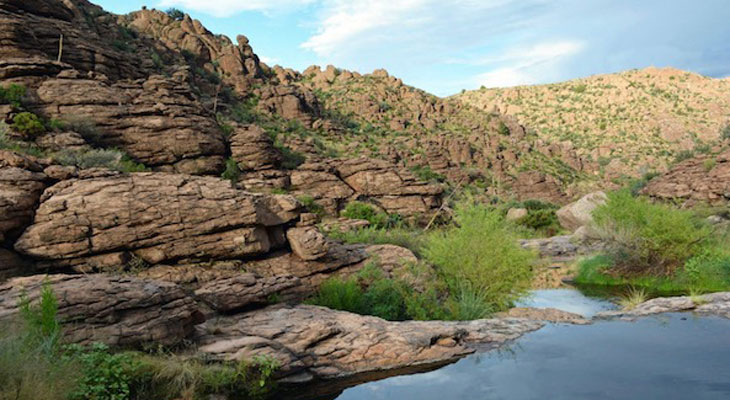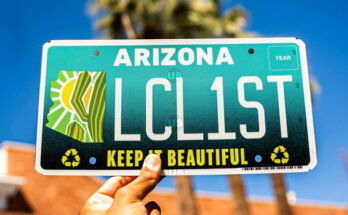Contributed Photo/Courtesy Sacred Land Film Project: Oak Flat, Chich’il Bildagoteel, is at the center of a dispute between the San Carlos Apache Tribe and Resolution Copper.
WASHINGTON D.C.— Congressional and tribal leaders from across the country joined the San Carlos Apache Tribe on Wednesday and demanded that the Biden Administration protect sacred Oak Flat in eastern Arizona from being destroyed by the proposed Resolution Copper Mine that is owned by a multi-national mining company with close financial ties to the Chinese government.
In meetings with White House officials and later during a prayer gathering to save Oak Flat in front of the White House, the message from U.S. tribal leaders to President Biden was clear: Do not issue an environmental report that will trigger a 60-day deadline to give Oak Flat to Resolution Copper Company.
“Today, I’m here talking to President Biden across the street,” San Carlos Apache Tribe Chairman Terry Rambler said as he turned and pointed at the White House. “And to tell him do not issue that Environmental Impact Statement. There is nothing in the law that says he has to do that. If he doesn’t issue the EIS, then this mine will not go through.”
The U.S. Forest Service, however, appears poised to publish the EIS on the permanent environmental and cultural impacts of what would be the largest new copper mine in North America.
Resolution Copper Company is owned by Anglo-Australian mining giants BHP (45%) and Rio Tinto (55%). The Chinese government controls nearly 15% of Rio Tinto’s stock through a Chinese government-owned mining company. China accounted for 57% of Rio Tinto’s sales in 2022.
Tribal leaders including Fawn Sharp, President of the National Congress of American Indians that represents 574 federally recognized tribes, Shan Lewis, President of the Inter Tribal Association of Arizona that represents 21 Arizona tribes, Ben Barnes, Chief of the Shawnee Tribe, and Jordan D. Joaquin, President of the Fort Yuma Quechan Indian Tribe, joined members of the San Carlos Apache Tribe for the prayer vigil.
“President Biden ran on an agenda of restoring the soul of the United States,” NCAI President Sharp said. “That mission begins with restoring the soul of Native America. It is impossible to restore the soul of this country when the soul of our people is compromised, jeopardized, and destroyed.”
Three members of Congress also spoke in support of saving Oak Flat during the gathering including, Rep. Raul Grijalva, D-AZ, Rep. Melanie Stansbury, D-NM, and Rep. Teresa Leger Fernandez, D-NM.
“There is no way to mitigate the impact of mining this sacred site,” Rep. Stansbury said. “We will not stand by and allow a multi-national corporation to strip mine a sacred indigenous site in the United States.”
Rep. Fernandez urged the Administration not to issue an EIS because the government has not fully consulted with tribes about the mine’s impact. “They have not done what they need to do,” she said. “They have not listened how they need to listen. They have not paid attention (to) how they need to pay attention.”
A nongermane rider attached to the FY2015 defense spending bill mandates that the Forest Service give Oak Flat to Resolution Copper regardless of the devastating environmental and cultural damage the mine would cause. The mine would use massive amounts of dwindling Arizona water supplies during an ongoing megadrought.
Rep. Grijalva criticized the Congressional legislative process that was used to pass the law that avoided debate and a floor vote by attaching the Southeast Arizona Land Exchange and Conservation Act to the 2015 National Defense Authorization Act.
“Oak Flat is sacred land, not a political bargaining chip,” Rep. Grijalva said in a statement issued after the vigil. “The Biden administration has the chance to show the San Carlos Apache Tribe and all the tribal communities who visit and hold traditional religious ceremonies at Oak Flat that their rights matter more than the profits of a Chinese government-backed mining company. I urge them to make the right decision.”
Oak Flat is listed on the National Historic Register of Historic Places as a Traditional Cultural Property. It is located on the Tonto National Forest about 70 miles east of Phoenix. Oak Flat, also known as Chi’chil Bildagoteel, is within the ancestral homelands of Western Apaches. Oak Flat holds deep spiritual significance for site-based Apache religious practices.
Prior to the prayer gathering, tribes from across the country met privately with White House officials to encourage President Biden to protect Oak Flat by upholding treaty obligations and fulfilling promises by his Administration to include Tribes in federal decision-making.
“Conveying federal lands that include a known sacred area to a private company for destructive mining activities would set a dangerous precedent for all tribal nations,” Tohono O’odham Nation Chairman Ned Norris Jr.stated in a letter to President Biden urging him to protect Oak Flat. “Protecting tribal sacred sites and cultural resources is essential to upholding the federal trust responsibility.”
Resolution Copper Company is owned by Anglo-Australian mining giants BHP (45%) and Rio Tinto (55%). The Chinese government controls nearly 15% of Rio Tinto’s stock through a Chinese government-owned mining company. China accounted for 57% of Rio Tinto’s sales in 2022.
The United States already exports more than 25% of the unprocessed copper extracted by U.S. mines because of a lack of domestic copper smelters. Resolution Copper has stated it does not intend to construct a new smelter, which would face legal and regulatory challenges due to the serious environmental hazards to communities created by the smelting process. China is the leading importer of unprocessed copper and operates nine of the 20 largest smelters in the world.
“Resolution’s copper is destined for overseas markets and will do nothing to help supply the domestic renewable energy economy,” Chairman Rambler said. “It is clearly in the best interest of the American people and Native American sovereignty and respect for our traditional religious practices, to leave this copper in the ground.”
The United States does not need to develop the Resolution Mine to meet domestic demand. Copper is not on the U.S. Geological Survey’s (USGS) list of critical minerals because the United States has very reliable trade partners (Canada, Chile, and Mexico) for importing refined copper. The U.S. is also the fifth largest copper producer in the world.
In addition, copper is 100% recyclable. The USGS reports that 32% of the U.S. copper supply in 2021 came from recycled copper. The USGS anticipates at least six domestic copper recycling facilities to begin operating within the next few years.










